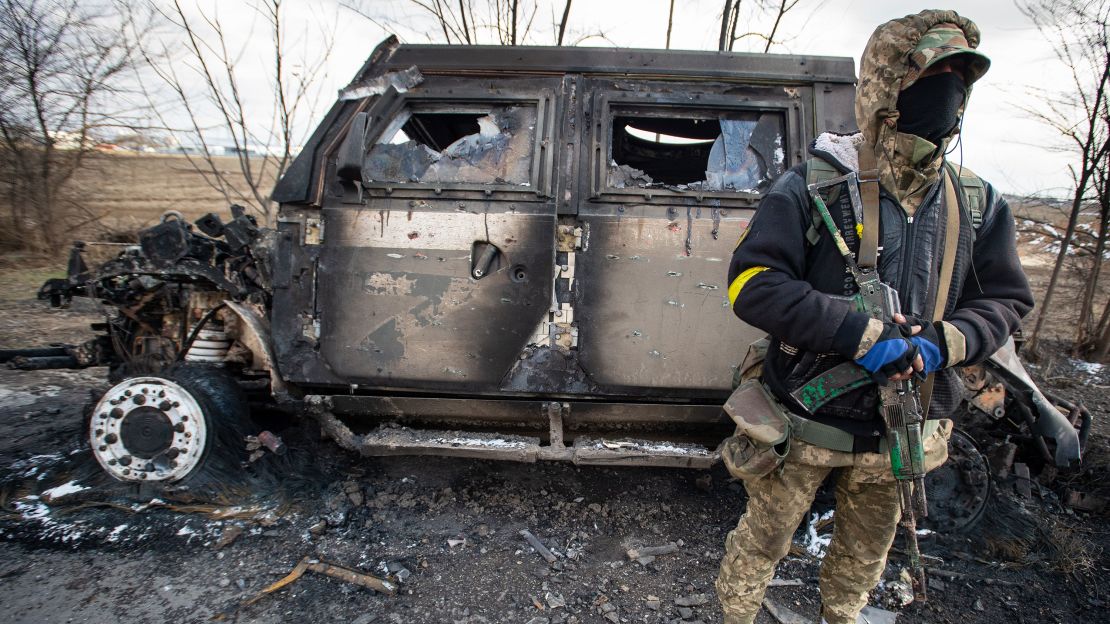The road between Kherson and Mykolaiv is sparse and ghostly. Civilians flee at high speed in one direction, as vans of grimacing troops head the other way.
The fate of the key port of Mykolaiv will likely be decided along this stretch of concrete in southern Ukraine. Russian forces are moving from the occupied city of Kherson to pound villages along its once peaceful plains and Ukraine claims a counter-attack is pushing them back.
One minibus fleeing the village of Luch carries five adults, who describe how only 10 of the 18 homes there remained standing. “No electricity, gas, water or heat,” one woman says, adding that a school had been demolished. In the rear seat, another Luch resident adds: “The only ones left are those who can’t leave.”
In the back sits 75-year-old Halyna, who was originally born in Tambov, Russia. She smiles wistfully as she remembers her late Ukrainian husband whom she left Russia to live with. She trembles and weeps onto the seat in front of her. “It was never before like this. It’s cold inside me, I’m shaking. So scary.”
Ukrainian troops on the road are edgy, and three young soldiers briefly point their guns at a CNN crew – despite the journalists wearing “press” on their protective vests – before they apologize.

Ukrainian anxiety on the road is likely enhanced by fears of Russian saboteurs, but also a recent warning from the regional governor Vitali Kim that separatist militants from Donbas were attacking locals suspected of having links to the armed forces.
Within minutes, troops on the same highway have fortified their positions at a checkpoint with cut-down trees and tires, the fluid environment on the road reflected in their constantly changing presence.
On Tuesday, the Ukrainian military destroyed a number of Russian military helicopters at the Kherson International Airport, new satellite images from Planet Labs show. A large black plume of smoke is seen rising from the airport in the images, with a number of helicopters on fire.
But Ukrainian positions nearby are crude: trenches dug in the farmland along a highway pock-marked with shell impacts. Some of the soldiers are local – one pointing to his neighborhood in the city – and others are from the nearby city of Odesa, which is Russia’s eventual target along the Black Sea coast.
The conditions they endure are startling: this is not a trench network of Javelin missiles or sophisticated NATO arms deliveries. Crude stoves boil water, and trees and soil form the roofs of shelters. Every night the Russian Grad rocket systems target them; the intense bombardment has left at least one of the troops shell-shocked, a soldier said.
Still, their morale appears higher than that of the Russian troops they captured over a week ago when a Tigr armored vehicle launched a failed assault on a nearby roundabout.


One Ukrainian soldier said of the captured Russians: “They said they can’t understand what’s going on. They can’t go back, because back there they’re being shot for retreating. So they advance or surrender.”
Across the farmland around the highway, rocket tips protrude gruesomely from the arable land – a hazard for years to come and indication of how random the bombardment can be.
In Mykolaiv, a large line of women and children has formed, as a number of buses snakes around them. A soldier, Oleksandr, waves goodbye to his son through the bus window, before returning to the city’s southern defenses.
Another man, a former sailor, helps push his wife and daughter through the crowds onto the transport. “This my wife Zheniya, and daughter Varvara. She go Poland. After come back. I go to the …” he said, indicating with his head towards the front lines. “What I must do? I go to Poland? No, this is my country, I will stay here.”

Dusk comes with sirens, and the distant rumble of shelling that sometimes hits residential compounds in the city. A curfew has been established for weeks, enforced by police who patrol the eerily empty streets. Their blue lights often flag down stray, drunk locals. It is slow work. Every phone must be checked for suspicious photographs of military installations.
Suddenly, a call comes in for help with an urgent blood delivery, from surgeons at a key hospital. The police blue lights starkly illuminate the four-story building – in the blackout the hospital appears almost invisible in the gloom to protect it from Russian airstrikes.
The bombing of Mykolaiv has grown in ferocity and its indiscriminate nature. Sunday saw the worst example yet when a rocket hit outside a store, killing nine people outright. One was Svetlana’s husband. She sits alone in a room in hospital, her arm bandaged, her fragile form shaking. “Such grief,” she weeps. “In a moment, everyone gone.”

Svetlana’s loss is compounded by the death of her daughter, in the Czech Republic, away from the war, earlier in the week. She and her husband were buying candies for the funeral wake when the bomb hit, robbing her of the only person she had left.
“We went to buy sweets to remember her,” she said. “Then the rockets landed and my husband just exploded and the blood came from his head. And he is still lying there in the blood and they took me here. And I am here and he is there. In pieces.”
The hospital staff have done what they can to patch up her wounded arm, but they are too overloaded to care for her well-being in the months ahead. Blood still on her coat, she totters slowly out of the hospital doors, and across its cold, barren courtyard, back into the city.


